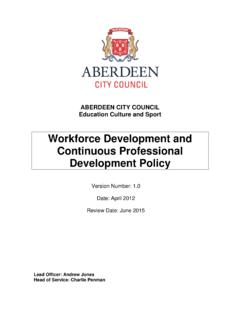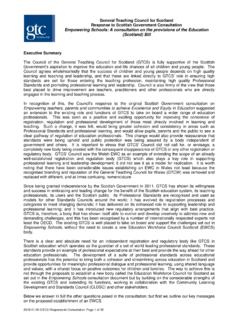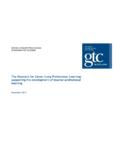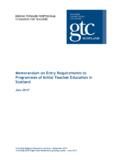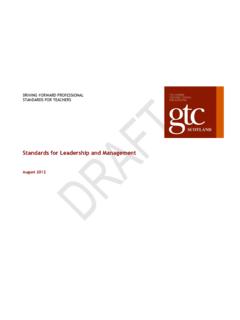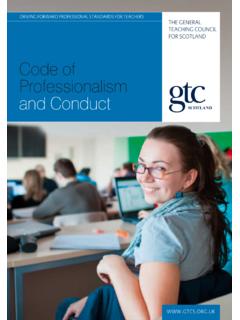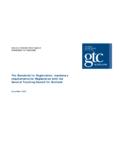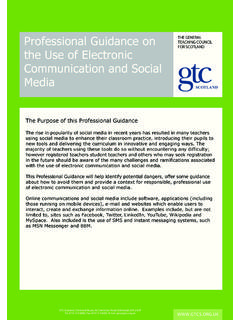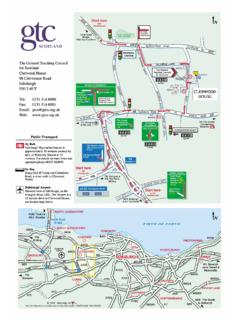Transcription of The Standards for Leadership and Management: supporting ...
1 DRIVING FORWARD PROFESSIONAL Standards FOR TEACHERS The Standards for Leadership and Management: supporting Leadership and management development December 2012 Contents Page The Standards for Leadership and Management .. 1 Introduction .. 2 1 Professional Values and Personal Commitment .. 6 2 Strategic Vision, Professional Knowledge and Understanding and Interpersonal Skills and Abilities .. 8 Strategic Vision .. 8 Professional Knowledge and Understanding .. 8 Interpersonal Skills and Abilities .. 9 3 The Professional Actions of Middle Leaders .. 11 The Key Purpose of Middle Leaders .. 11 Develop a range of strategies for individual and collective self-evaluation which contribute to school improvement .. 11 Develop coherent approaches to professional learning which build and sustain teachers practice .. 12 Lead and work collaboratively to enhance teaching which leads to high quality learning experiences.
2 13 Build and sustain partnerships with colleagues, learners, parents and other stakeholders to meet the identified needs of all learners .. 15 Manage allocated resources proactively and effectively to meet learning and development priorities .. 16 4 The Professional Actions of Head Teachers .. 17 The Key Purpose of Head Teachers .. 17 Establish, sustain and enhance the culture of self-evaluation for school improvement .. 17 Develop staff capability, capacity and Leadership to support the culture and practice of learning .. 19 Ensure consistent, high quality teaching and learning for all learners .. 21 Build and sustain partnerships with learners, families and relevant partners to meet the identified needs of all learners .. 22 Allocate resources effectively in line with identified strategic and operational priorities .. 23 Standards for Leadership and Management Dec 2012 1 The Standards for Leadership and Management The Standard for Middle Leadership The Standard for Career-Long Professional Learning The Standard for Headship The Standard for Full Registration The Standard for Provisional Registration 2 Standards for Leadership and Management Dec 2012 Introduction The Standards for Leadership and Management, which supersede the Standard for Headship (Scottish Executive, 2005), include both the Standard for Middle Leadership and the Standard for Headship.
3 The Standards for Leadership and Management are part of the suite of GTC Scotland s Professional Standards which also include the Standards for Registration and the Standards for Career-Long Professional Learning and have been developed to support the self-evaluation and professional learning of those in, or aspiring to, formal Leadership roles in schools. These Standards are underpinned by the themes of values, sustainability and Leadership . Professional values are at the core of the Standards for Leadership and Management. They are integral to, and demonstrated through, all our professional relationships and practices. Learning for Sustainability is a whole- school commitment that helps the school and its wider community develop the knowledge, skills, attitudes, values and practices needed to take decisions which are compatible with a sustainable future in a just and equitable world. Learning for sustainability has been embedded within the Standards for Leadership and Management to support leaders in actively embracing and promoting principles and practices of sustainability in all aspects of their work.
4 GTC Scotland recognises that effective Leadership depends on the principles of collegiality. All teachers should have opportunities to be leaders. They lead learning for, and with, all learners with whom they engage. They also work with, and support the development of, colleagues and other partners. The Standards for Leadership and Management include a focus on Leadership for learning, teacher Leadership , and working collegiately to build Leadership capacity in others. Standards for Leadership and Management Dec 2012 3 Elements of all of the Standards are organised into inter-related categories with Professional Values and Personal Commitment at the heart. These elements are inherently linked to each other in the development of teachers, and one aspect does not exist independently of the others. It is this inter-relationship among all of the categories which develops their understanding, their practice and their professionalism.
5 Professional Knowledge and Understanding Professional Skills and Abilities Professional Values and Personal Commitment Professional Actions Strategic Vision 4 Standards for Leadership and Management Dec 2012 Leadership and Management Leadership is central to educational quality. Leadership is the ability to: develop a vision for change, which leads to improvements in outcomes for learners and is based on shared values and robust evaluation of evidence of current practice and outcomes; mobilise, enable and support others to develop and follow through on strategies for achieving that change; Management is the operational implementation and maintenance of the practices and systems required to achieve this change. Those in, or aspiring to, promoted roles (Principal Teacher, Depute Head Teacher, Head Teacher) within the education system will develop increasing responsibility and capacity in relation to the kinds of roles outlined here.
6 These roles may include responsibility for team and line management. All leaders have a responsibility for ensuring the mobilisation of inter-agency working across the learning community and beyond, particularly by building staff capability, in order to achieve positive outcomes for all learners. Middle leaders in schools will have different areas of responsibility in addition to enhanced pedagogical skills, which may include curriculum Leadership , departmental or faculty Leadership , pastoral Leadership , Leadership in additional support provision, or Leadership of school improvement priorities. They may have line management responsibility for a team of staff, lead a team delivering a specific area of provision, or a team involved in development activities. In taking their particular areas of responsibility forward, middle leaders will work and contribute to the school improvement agenda, particularly in building a culture of teaching and learning to address the needs of all learners, while also contributing to the development of capability more generally.
7 Head Teachers, working with others, establish, sustain and enhance a culture of learning and a positive ethos in collaboration with the whole school community to ensure that every learner achieves his/her potential. Head Teachers are accountable for ensuring that the context and culture are set for others to lead effectively and that there is a clear and agreed focus on self-evaluation and improvement. Head Teachers and other educational leaders contribute to Leadership for improvement at system level (authority and national level). This includes the ability to offer significant support to peers and other educational establishments or make significant contributions to policy development across cluster, local authority or national education systems. The Standards for Leadership and Management are designed to be used in conjunction with the Framework for Educational Leadership (Education Scotland, 2012) to support individual self-evaluation and reflection as an integral part of Leadership development.
8 It is vital that Leadership development is supported by effective and systematic Professional Review and Development (PRD) and Professional Update processes. Standards for Leadership and Management Dec 2012 5 Purpose The Standards for Leadership and Management will be used for multiple purposes, including: support for self-evaluation and reflection for teachers in, and aspiring to, formal Leadership roles in our schools; the design of programmes for aspiring or serving middle leaders; the design of programmes leading to the attainment of the professional award and / or academic qualification leading to the Standard for Headship; an assessment framework for such programmes; a template to plan and enhance coherent Leadership development pathways and programmes; informing the process of recruitment and selection; contributing to dialogue about Leadership and management. The Standards for Leadership and Management have not been designed as benchmarks of teacher competence and therefore should not be used in this way.
9 6 Standards for Leadership and Management Dec 2012 1 Professional Values and Personal Commitment The Professional Values and Personal Commitment should be read in conjunction with the GTC Scotland Code of Professionalism and Conduct (COPAC). Professional values are at the core of the Professional Standards . The educational experiences of all our learners are shaped by the values and dispositions of all those who work to educate them. Values are complex and are the ideals by which we shape our practice as professionals. Starting with us as individuals, values extend to all those for whom we are responsible and to the world in which we live. They drive an unswerving personal commitment to all learners intellectual, social and ethical growth and well-being. They are integral to, and demonstrated through, all our professional relationships and practices and all that we do to meet our professional commitments and obligations as teachers registered with GTC Scotland.
10 Professionalism also implies the need to ask critical questions of educational policies and practices and to examine our attitudes and beliefs. Values, and the connections between values and practices, need to be regularly re-appraised over the course of teachers careers as society and the needs of learners change and as understanding develops. This is central to the adaptability, responsiveness and relevance of the profession. The Professional Values and Personal Commitment core to being a teacher are: Social Justice Embracing locally and globally the educational and social values of sustainability, equality and justice and recognising the rights and responsibilities of future as well as current generations. Committing to the principles of democracy and social justice through fair, transparent, inclusive and sustainable policies and practices in relation to: age, disability, gender and gender identity, race, ethnicity, religion and belief and sexual orientation.
